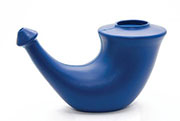Tap Water Used in Neti Pots Tied to Rare, Fatal Brain InfectionBoiled or filtered water safer for preparation, expert says.By Amanda Gardner 
THURSDAY, Aug. 23 (HealthDay News) -- Two people in Louisiana died last year from a rare brain infection contracted after using neti pots containing tap water to flush their sinuses. The infection, known as primary amebic meningoencephalitis, occurs after water containing the amoeba Naegleria fowleri enters the nose and travels through the olfactory nerve into the brain. This is the first time tap water and neti pots have been connected to infection with N. fowleri, according to a report appearing online Aug. 23 in Clinical Infectious Diseases. Neti pots are small vessels that are filled with water and saline solution and used to flush the sinuses. Although the infection is extremely rare, it is almost uniformly fatal, said Dr. Ann Falsey, a professor of medicine at the University of Rochester Medical Center, who was not involved with the study. According to Jonathan Yoder, lead author of the paper, 123 cases have been reported since 1962, the year it was discovered. Yoder is coordinator of waterborne diseases and outbreak surveillance at the U.S. Centers for Disease Control and Prevention. N. fowleri is generally found in warmish freshwater ponds, lakes and rivers and can be contracted by swimming, fishing, boating, diving or tubing in such bodies of water. The first patient to succumb to the infection via a neti pot was a 28-year-old man from southern Louisiana who developed a severe headache along with neck stiffness, back pain and vomiting on June 5, 2011. The next day he arrived at a New Orleans hospital disoriented, confused and combative. He received a tentative diagnosis of amebic meningoencephalitis, was treated immediately with a combination of drugs but nevertheless died in the neurologic critical care unit on June 8. The man lived with his mother, who reported that he had not been near any freshwater recently but that he did irrigate his sinuses daily with a neti pot. She said he added a commercially sold salt packet to tap water. A similar case, this one in a 51-year-old woman in northern Louisiana, occurred three months later. The woman was admitted to a hospital on Sept. 28 with nausea, vomiting, neck stiffness and "altered mental status." She died Oct. 2 and an autopsy revealed amebic meningoencephalitis. Again, the woman's parents reported that their daughter had had no freshwater exposure in the past two weeks but also regularly used a neti pot. In both cases, N. fowleri was found in the tap water of the individuals' homes. Although N. fowleri cannot survive in salt water, the saline solutions used in these neti pots was unable to kill the organisms. Despite the severity of the infection, "very simple measures could prevent it," Falsey said. Yoder recommended using boiled or filtered water when preparing to use a neti pot. "Even though tap water is safe . . . for drinking, showering and bathing, it's certainly not sterile water and we don't think it's appropriate for something like nasal irrigation," he said. And there are other reasons not to use tap water for nasal irrigation, including the presence of E. coli and the bacteria legionella, Falsey said. Officials don't know why these two cases occurred in Louisiana, but there is some evidence that N. fowleri may be expanding its reach, particularly into northern areas, which are experiencing warmer weather. A case of primary amebic meningoencephalitis was reported for the first time in Minnesota in 2010 and also in Kansas in 2011. More information The U.S. Centers for Disease Control and Prevention has more on N. fowleri and primary amebic meningoencephalitis. (SOURCES: Jonathan Yoder, M.P.H., coordinator, waterborne diseases and outbreak surveillance, U.S. Centers for Disease Control and Prevention; Ann Falsey, M.D., professor of medicine, University of Rochester Medical Center, Rochester, N.Y.; Aug. 23, 2012, Clinical Infectious Diseases, online ) Copyright © 2012
HealthDay. HealthDayNews articles are derived from various sources and do not reflect federal policy. healthfinder.gov does not endorse opinions, products, or services that may appear in news stories. For more information on health topics in the news, visit Health News on healthfinder.gov. |